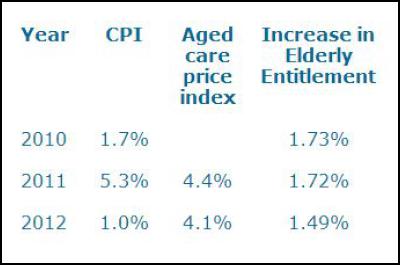Understanding the Latest Announcements on Aged Care Funding
Media release from NZ Aged Care Association
Understanding the Governments Latest Announcements on Aged Care Funding Increases
Today the National Government announced some pre budget funding increases for the aged residential care sector. These were:
“$12 million increase in funding for dementia bed subsidies over four years, to encourage further investment in dementia beds”.
The $12 million increase in dementia care over four years equates to a yearly increase of $3 million across 20 DHBs. In terms of the daily entitlement for the elderly it represents a 2.51% increase in dementia care funding which is currently around $150 per day gst exclusive.
Including the 0.89% increase funded out of the $33.2 million over four years, this means the total increase in the dementia rate as of 1 July is 3.4%
“This is another good increase in the dementia rate and means the underfunding of this service has reduced from about 36% to 17% in the last three years based on the 2010 Aged Residential Care Review paid for by the Government,” the Chief Executive of NZACA, Martin Taylor, said today.
“In addition district health boards have been funded to invest an additional $33.2 million on aged residential care subsidies over four years”.
The $33.2 million increase over four years equates to an $8.3 million increase per year, or a 0.89% increase in the daily entitlement for the elderly in rest home, hospital or dementia level care.
The 2010 Aged Residential Care Review also established the daily entitlement for the elderly in rest home care was 40% underfunded and the hospital rate 17% underfunded.
These underfunding levels have increased over the last three years as inflationary pressures have not been met. The table below sets out the Aged Care Price Index (ACPI)[1] which shows inflationary pressures in the aged care sector have been well ahead of CPI and funding increases.

In 2012, there were around 32,000 people in care at any one time and about 40,000 elderly received care in one calendar year. The average length of stay at rest home level is around one year and six months at hospital level care.
[1] The ACPI is based on the relevant goods and services pricing from a full suite of products that Statistics New Zealand price within the Producers Price Index (PPI)[1]. The exception is wage costs, which were established from the Quarterly Employment Survey (QES).
ENDS


 Gordon Campbell: On The Trump Upside, And Peters Persecution Of Trans People
Gordon Campbell: On The Trump Upside, And Peters Persecution Of Trans People New Zealand Defence Force: Second World War Veterans Receive Message From King Charles
New Zealand Defence Force: Second World War Veterans Receive Message From King Charles New Zealand Government: More Than 900 Health Graduates To Receive Financial Boost Through Bonding Scheme
New Zealand Government: More Than 900 Health Graduates To Receive Financial Boost Through Bonding Scheme New Zealand Police: Stacks Of Cocaine Unpacked In Mt Wellington
New Zealand Police: Stacks Of Cocaine Unpacked In Mt Wellington Te Pāti Māori: Te Pāti Māori Make Submission To Privileges Committee In Absentia
Te Pāti Māori: Te Pāti Māori Make Submission To Privileges Committee In Absentia PSA: PSA Forces Changes To Restructure Of Data & Digital And Pacific Health
PSA: PSA Forces Changes To Restructure Of Data & Digital And Pacific Health Waitangi Treaty Grounds: Anzac Day Commemorative Evening Service At The Waitangi Treaty Grounds
Waitangi Treaty Grounds: Anzac Day Commemorative Evening Service At The Waitangi Treaty Grounds


